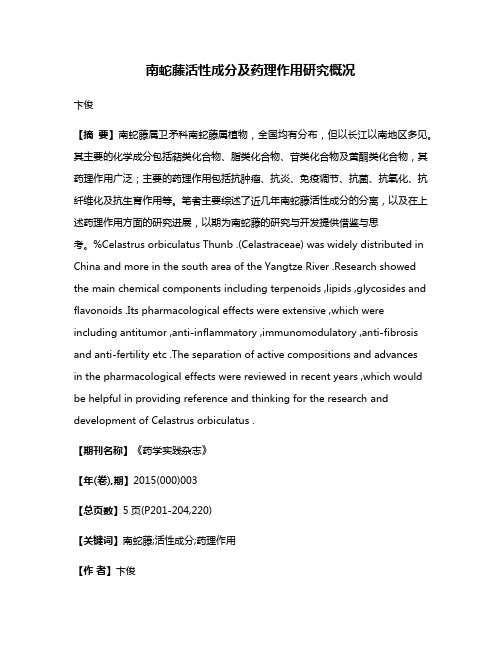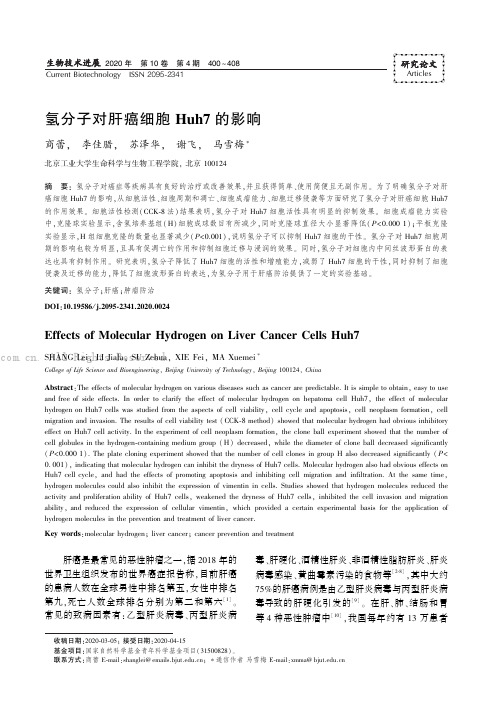HMGB1对人肝癌细胞增殖及转移能力的影响
5-FU对肝癌细胞HepG2增殖的影响

1.
王惠,徐陆周,吴坚,等.理冲汤加减联合5-氟尿嘧啶对人肝癌细HepG2上皮间质转化的影响[J].中国实验方剂学杂志,2019,25(7):14-21..
2.
Venook AP, Papandreou C, Furuse J, de Guevara LL. The incidence and epidemiology of hepatocellular carcinoma: a global and regional perspective.Oncologist. 2010;15 Suppl 4:5-13. doi:10.1634/theoncologist.2010-S4-05.
1.2仪器
IX71倒置显微镜(日本奥林巴斯株式会社),Epoch超微量分光光度计(美国BIO-TEK公司),Calibur流式细胞仪(美国BD公司)。
1.3细胞培养
HepG2细胞,含10%小牛血清,1%青/链霉素的高糖DMEM培养液,于37℃、5%CO2培养箱中培养。0.25%的胰酶消化传代。
1.4CCK-8检测细胞增殖
6.
殷晓丽,刘兆玉.上皮间质转化在肿瘤中的研究进展[J].医学综述,2017,23(12):2359-2363,2369
7.
Matheson DS, Green B, Hoar DI. The influence of methotrexate and thymidine on the human natural killer cell function in vitro. J Immunol. 1983;131(4):1619-1621.
1材料与方法
1.1材料
人肝癌细胞HepG2,为本实验室保存。小牛血清购自杭州四季青公司,DMEM培养液购自Invitrogen公司。CCK8细胞增殖检测试剂盒和细胞周期检测试剂盒购自江苏凯基生物公司。其他生化试剂均为进口或国产分析纯试剂。5-氟尿嘧啶购自天津金耀氨基酸有限公司(批号:1803091)。
黄芪对肝癌细胞增殖的抑制作用研究

黄芪对肝癌细胞增殖的抑制作用研究摘要:肝癌是全球范围内较为常见和致命的肿瘤之一。
黄芪作为一种传统中药,被广泛应用于肿瘤治疗。
本研究旨在探究黄芪对肝癌细胞增殖的抑制作用以及其潜在的分子机制。
研究结果表明,黄芪能够显著抑制肝癌细胞增殖,并且此作用可能与细胞周期调控、细胞凋亡以及抗氧化活性相关。
这些发现为进一步研究黄芪作为肝癌治疗的潜力提供了重要的实验依据。
引言:肝癌是世界范围内的常见恶性肿瘤,具有高发病率和死亡率的特点。
传统的治疗方式包括手术切除、放射疗法和化学药物治疗。
然而,由于肝癌的复杂性以及传统治疗方法的局限性,寻找新的治疗策略和药物变得尤为重要。
黄芪是一种常见的中药材,被广泛用于中医临床实践中。
它被认为具有多种生物活性,如抗氧化、抗炎、抗肿瘤等。
然而,虽然一些研究已经探究了黄芪在肿瘤治疗中的潜力,但对黄芪对肝癌细胞增殖的抑制作用的研究还相对较少。
方法:本研究选取人体肝癌细胞株作为研究对象,利用细胞培养技术将其培养至对数生长期。
随后,黄芪提取物被加入到培养基中,通过MTT法检测细胞活力,评估黄芪对肝癌细胞增殖的抑制作用。
此外,还应用免疫荧光分析、细胞周期分析和Western blot技术来研究黄芪可能的作用机制。
结果:实验结果显示,黄芪对肝癌细胞增殖具有明显的抑制作用。
随着黄芪浓度的增加,细胞活力呈剂量依赖性下降。
免疫荧光结果显示,黄芪可以抑制肝癌细胞中增殖相关标志物的表达。
细胞周期分析表明,黄芪可引起肝癌细胞周期的阻断,影响细胞的生长和分裂。
此外,黄芪还可以诱导肝癌细胞凋亡,促进细胞死亡。
最后,Western blot结果显示,黄芪对于一些凋亡相关蛋白的表达水平具有调节作用。
讨论:黄芪作为一种传统中药,具有潜在的抗肿瘤活性。
本研究发现,黄芪对肝癌细胞增殖具有明显的抑制作用,与细胞周期调控、细胞凋亡以及抗氧化活性可能有关。
这些结果与先前的研究相一致,进一步验证了黄芪作为治疗肝癌的潜力。
在细胞周期调控方面,黄芪可能通过调节细胞周期蛋白和细胞周期调控因子的表达来抑制肝癌细胞的增殖。
南蛇藤活性成分及药理作用研究概况

南蛇藤活性成分及药理作用研究概况卞俊【摘要】南蛇藤属卫矛科南蛇藤属植物,全国均有分布,但以长江以南地区多见。
其主要的化学成分包括萜类化合物、脂类化合物、苷类化合物及黄酮类化合物,其药理作用广泛;主要的药理作用包括抗肿瘤、抗炎、免疫调节、抗菌、抗氧化、抗纤维化及抗生育作用等。
笔者主要综述了近几年南蛇藤活性成分的分离,以及在上述药理作用方面的研究进展,以期为南蛇藤的研究与开发提供借鉴与思考。
%Celastrus orbiculatus Thunb .(Celastraceae) was widely distributed in China and more in the south area of the Yangtze River .Research showed the main chemical components including terpenoids ,lipids ,glycosides and flavonoids .Its pharmacological effects were extensive ,which were including antitumor ,anti-inflammatory ,immunomodulatory ,anti-fibrosis and anti-fertility etc .The separation of active compositions and advancesin the pharmacological effects were reviewed in recent years ,which would be helpful in providing reference and thinking for the research and development of Celastrus orbiculatus .【期刊名称】《药学实践杂志》【年(卷),期】2015(000)003【总页数】5页(P201-204,220)【关键词】南蛇藤;活性成分;药理作用【作者】卞俊【作者单位】解放军411医院,上海200081【正文语种】中文【中图分类】R28南蛇藤(Celastrusorbiculatus Thunb.)系卫矛科南蛇藤属植物,南蛇藤属植物全世界有50种,我国30种。
单核苷酸多态性_环境因素与肝细胞肝癌遗传易感性的关系_纪龙

文章编号:100028020(2009)022*******・综述・单核苷酸多态性、环境因素与肝细胞肝癌遗传易感性的关系纪龙综述 余红平审校广西医科大学公共卫生学院,南宁 530021摘要:肝细胞肝癌(HCC )的发生和演进是一个多基因、多因素的复杂过程,是遗传与环境因素相互作用的结果。
单核苷酸多态性(S NP )作为第三代遗传标记,充分反映了个体间的遗传差异,决定了个体对疾病的易感性,正成为肝癌遗传易感性研究的重要工具。
关键词:单核苷酸多态性 环境因素 肝细胞肝癌 遗传易感性 肝肿瘤中图分类号:R73517R73011 文献标识码:AR elationship of single nucleotide polymorphism ,environmental factors and the hereditary susceptibility of hepatocellular carcinomaJI Long ,YU H ongpingSchool of Public Health ,G uangxi Medical University ,Nanning 530021,ChinaAbstract :Resulting by the interaction between the hereditary factor and the environmental factor ,the occurrence anddevelopment of hepatocellular carcinoma (HCC )is a com plicated course with multi 2genes and multi 2factors.As the third genetic marker ,the single nucleotide polym orphism reflects the hereditary difference am ong individuals ,decides the susceptibility to disease and becomes an im portant tool to study the hereditary susceptibility of HCC.K ey w ords :single nucleotide polym orphism ,environmental factor ,hereditary susceptibility ,hepatocellular carcinoma基金项目:国家自然科学基金资助项目(N o.30660162);广西自然科学基金资助项目(N o.桂科攻0592007221);广西研究生教育创新计划资助项目(N o.2008105981004M189);广西大型仪器协作网测试补助(N o.529220072108)作者简介:纪龙,男,硕士研究生,助教,研究方向:慢性病流行病学,E 2mail :tsmcjl @ 肝细胞肝癌(HCC )是我国最常见的恶性肿瘤之一,死亡率为2014Π10万,严重威胁人们的生命健康。
HMGB1过表达和沉默影响子宫内膜癌HEC-1A细胞增殖和侵袭及其机制

AB S T 队 C T
O b j e c t i v e : T o i n v e s t i g a t e e f e c t s o f o v e r . - e x p r e s s i o n a n d s u p p r e s s i o n o f HM G B 1 o n p r o l i f e r a t i o n
H MG B 1 重组质粒和H MG B 1 s h R N A 的慢病毒载体并转染人子宫内膜癌H E C . 1 A ,建立过表达和沉默HMG B 1 基 因的H E C 一 1 A 细胞株。采用细胞增殖/ 毒性活性检测试剂盒( c e l l c o u n t i n g k i t - . 8 ) 、T r a n s w e l l / b 室 、细胞划痕实验分析HMG B 1 过表达 和沉默对子宫内膜癌H E C . 1 A 细胞生长 、增殖、侵袭及转移的影响。采用We s t e r n  ̄迹和反转录P C R ( r e v e r s e t r a n s c r i p t i o n . P C R ,R T . i , c R ) 检测过表达和沉默H MG B 1 后H E C — l A 细胞 中N F — K B ,V E G F 及基质金属蛋白酶2 ( m a t r i x me t a l 1 0 p r 0 t e i n a s e 2 , MMP 2 ) 的表达情况。结果 :过表达H MG B I  ̄够促进子宫内膜癌H E C . 1 A 细胞增殖 、侵袭与转移 ,且H E C . 1 A 细胞 中
, C e n t S o u t h U n f M S c f j r
中南大学学报
2 0 1 7
冬凌草甲素对人肝癌MHCC-97H细胞系侵袭和迁移的作用

冬凌草甲素对人肝癌MHCC-97H细胞系侵袭和迁移的作用李春雨;王琪;申珅;苏玮莲;李经秀;李国霞【摘要】AIM: To investigate the effects of oridonin on the invasion and migration of hepatocelluar carcinoma cells.METHODS: Human hepatocelluar carcinoma MHCC-97H cells were cultured and treated with 5, 10 or 20 μmol/L oridonin.The migration ability was measured by wound healing assay.The invasion ability was examined by Transwell invasion assay.The adhesion capabilities were evaluated by adhesion assay.The protein levels of LIM kinase-1 (LIMK-1), cofilin and phosphorylated cofilin (p-cofilin) were determined by Western blot.RESULTS: Oridonin inhibited the migration, invasion and adhesion abilities of MHCC-97H cells in a dose-dependent manner (P<0.05).After oridonin treatment, the expression of cofilin had no obvious change, but the protein levels of LIMK-1 and p-cofilin decreased significantly.CONCLUSION: Oridonin inhibits the invasion and migration of MHCC-97H cells.The mechanism may be related with the regulatory effect of oridonin on LIMK-1/cofilin signal transduction pathway.%目的: 探讨冬凌草甲素(oridonin)对肝癌细胞侵袭和迁移的影响及其机制.方法: 采用细胞培养技术培养人肝细胞癌MHCC-97H细胞,用不同浓度的冬凌草甲素处理肝癌细胞,采用划痕实验检测细胞的迁移能力;Transwell实验测定细胞的侵袭能力;黏附实验评价细胞的黏附能力;Western blot法检测LIM激酶1(LIMK-1)、丝切蛋白(cofilin)和磷酸化cofilin(p-cofilin)蛋白水平的改变.结果: 冬凌草甲素可明显降低肝癌细胞的体外侵袭、迁移及黏附能力(P<0.05),且在一定浓度范围内具有明显的量效关系.冬凌草甲素干预处理细胞后,cofilin的蛋白水平无明显变化,LIMK-1和p-cofilin的蛋白水平明显下调.结论: 冬凌草甲素体外具有抑制肝癌MHCC-97H细胞侵袭和迁移的作用,其机制可能与调控LIMK-1/cofilin信号通路有关.【期刊名称】《中国病理生理杂志》【年(卷),期】2017(033)008【总页数】5页(P1423-1427)【关键词】冬凌草甲素;肝细胞癌;细胞侵袭;细胞迁移;细胞黏附【作者】李春雨;王琪;申珅;苏玮莲;李经秀;李国霞【作者单位】天津医科大学国际医学院, 天津 300070;同济大学附属上海市肺科医院肿瘤科, 上海 200433;天津医科大学国际医学院, 天津 300070;天津医科大学国际医学院, 天津 300070;天津医科大学国际医学院, 天津 300070;天津医科大学国际医学院, 天津 300070【正文语种】中文【中图分类】R329.21;R965肝细胞癌(hepatocellular carcinoma,HCC)是发病率居全球第5位的恶性肿瘤,死亡率居全球第3位[1]。
氢分子对肝癌细胞Huh7 的影响

生物技术进展2020年㊀第10卷㊀第4期㊀400~408CurrentBiotechnology㊀ISSN2095 ̄2341研究论文Articles㊀收稿日期:2020 ̄03 ̄05ꎻ接受日期:2020 ̄04 ̄15㊀基金项目:国家自然科学基金青年科学基金项目(31500828)ꎮ㊀联系方式:商蕾E ̄mail:shanglei@emails.bjut.edu.cnꎻ∗通信作者马雪梅E ̄mail:xmma@bjut.edu.cn氢分子对肝癌细胞Huh7的影响商蕾ꎬ㊀李佳腊ꎬ㊀苏泽华ꎬ㊀谢飞ꎬ㊀马雪梅∗北京工业大学生命科学与生物工程学院ꎬ北京100124摘㊀要:氢分子对癌症等疾病具有良好的治疗或改善效果ꎬ并且获得简单㊁使用简便且无副作用ꎮ为了明确氢分子对肝癌细胞Huh7的影响ꎬ从细胞活性㊁细胞周期和凋亡㊁细胞成瘤能力㊁细胞迁移侵袭等方面研究了氢分子对肝癌细胞Huh7的作用效果ꎮ细胞活性检测(CCK ̄8法)结果表明ꎬ氢分子对Huh7细胞活性具有明显的抑制效果ꎮ细胞成瘤能力实验中ꎬ克隆球实验显示ꎬ含氢培养基组(H)细胞成球数目有所减少ꎬ同时克隆球直径大小显著降低(P<0.0001)ꎻ平板克隆实验显示ꎬH组细胞克隆的数量也显著减少(P<0.001)ꎬ说明氢分子可以抑制Huh7细胞的干性ꎮ氢分子对Huh7细胞周期的影响也较为明显ꎬ且具有促凋亡的作用和抑制细胞迁移与浸润的效果ꎮ同时ꎬ氢分子对细胞内中间丝波形蛋白的表达也具有抑制作用ꎮ研究表明ꎬ氢分子降低了Huh7细胞的活性和增殖能力ꎬ减弱了Huh7细胞的干性ꎬ同时抑制了细胞侵袭及迁移的能力ꎬ降低了细胞波形蛋白的表达ꎬ为氢分子用于肝癌防治提供了一定的实验基础ꎮ关键词:氢分子ꎻ肝癌ꎻ肿瘤防治DOI:10.19586/j.2095 ̄2341.2020.0024EffectsofMolecularHydrogenonLiverCancerCellsHuh7SHANGLeiꎬLIJialaꎬSUZehuaꎬXIEFeiꎬMAXuemei∗CollegeofLifeScienceandBioengineeringꎬBeijingUniversityofTechnologyꎬBeijing100124ꎬChinaAbstract:Theeffectsofmolecularhydrogenonvariousdiseasessuchascancerarepredictable.Itissimpletoobtainꎬeasytouseandfreeofsideeffects.InordertoclarifytheeffectofmolecularhydrogenonhepatomacellHuh7ꎬtheeffectofmolecularhydrogenonHuh7cellswasstudiedfromtheaspectsofcellviabilityꎬcellcycleandapoptosisꎬcellneoplasmformationꎬcellmigrationandinvasion.Theresultsofcellviabilitytest(CCK ̄8method)showedthatmolecularhydrogenhadobviousinhibitoryeffectonHuh7cellactivity.Intheexperimentofcellneoplasmformationꎬthecloneballexperimentshowedthatthenumberofcellglobulesinthehydrogen ̄containingmediumgroup(H)decreasedꎬwhilethediameterofcloneballdecreasedsignificantly(P<0.0001).TheplatecloningexperimentshowedthatthenumberofcellclonesingroupHalsodecreasedsignificantly(P<0 001)ꎬindicatingthatmolecularhydrogencaninhibitthedrynessofHuh7cells.MolecularhydrogenalsohadobviouseffectsonHuh7cellcycleꎬandhadtheeffectsofpromotingapoptosisandinhibitingcellmigrationandinfiltration.Atthesametimeꎬhydrogenmoleculescouldalsoinhibittheexpressionofvimentinincells.StudiesshowedthathydrogenmoleculesreducedtheactivityandproliferationabilityofHuh7cellsꎬweakenedthedrynessofHuh7cellsꎬinhibitedthecellinvasionandmigrationabilityꎬandreducedtheexpressionofcellularvimentinꎬwhichprovidedacertainexperimentalbasisfortheapplicationofhydrogenmoleculesinthepreventionandtreatmentoflivercancer.Keywords:molecularhydrogenꎻlivercancerꎻcancerpreventionandtreatment㊀㊀肝癌是最常见的恶性肿瘤之一ꎬ据2018年的世界卫生组织发布的世界癌症报告称ꎬ目前肝癌的患病人数在全球男性中排名第五ꎬ女性中排名第九ꎬ死亡人数全球排名分别为第二和第六[1]ꎮ常见的致病因素有:乙型肝炎病毒㊁丙型肝炎病毒㊁肝硬化㊁酒精性肝炎㊁非酒精性脂肪肝炎㊁肝炎病毒感染㊁黄曲霉素污染的食物等[2 ̄8]ꎬ其中大约75%的肝癌病例是由乙型肝炎病毒与丙型肝炎病毒导致的肝硬化引发的[9]ꎮ在肝㊁肺㊁结肠和胃等4种恶性肿瘤中[10]ꎬ我国每年约有13万患者. All Rights Reserved.死于肝癌ꎬ占全世界肝癌病死总人数的45%ꎬ且每年新发46万人ꎬ占全世界的55%ꎬ属于肝癌多发和高发国家[11]ꎮ这跟我国是肝炎高发病率的国家密切相关[9]ꎮ国际肝癌疾病研究协会数据显示ꎬ肝癌的病死高发人群逐渐向青壮年偏移[12 ̄13]ꎮ且因肝癌具有多复发㊁转移性强和耐药等特点ꎬ使得临床治疗中多种治疗方式对于肝癌的治疗效果均不理想ꎬ且肝癌患者的预后及恢复效果也极差[14]ꎮ因此ꎬ减少肝癌的转移和复发是目前的研究重点ꎮ作为自然界最简单的分子ꎬ氢分子长期以来被人们认为是一种生理惰性气体ꎬ而近十几年来ꎬ氢分子医学领域发展十分迅速ꎬ并在各种疾病中展现出多种生物学效应ꎬ包括缓解创伤炎症㊁控制代谢疾病㊁缓解有机磷农药引起的神经毒性以及抑制肿瘤生成等[15]ꎮ氢分子发挥生物学作用的机理尚无定论ꎬ其可能通过选择性清除毒性自由基来抑制氧化应激反应ꎬ也可能通过作用于生物酶或调节细胞内信号分子来发挥作用[16 ̄20]ꎮLi等[21]研究肾细胞癌时发现ꎬ氢分子可防治次氮基三乙酸铁诱导的肾脏毒性和致癌性ꎮ研究显示ꎬ饮用富氢水可以显著降低组织中丙二醛(malond ̄ialdehydeꎬMDA)和过氧化亚硝酸盐的含量ꎬ从而降低氧化应激水平㊁缓解炎症反应ꎬ进而减弱次氮基三乙酸铁诱导的大鼠肾毒性ꎬ减轻大鼠的肾脏损伤并抑制其肿瘤早期发展ꎬ证明富氢水能够通过抗氧化和抗炎症作用达到对次氮基三乙酸铁诱导的肾毒性和致癌性的防治效果[21]ꎮ此外ꎬ氢分子还能减轻恶性肿瘤治疗所引发的副作用ꎮ如Kang等[22]的研究表明ꎬ通过让放疗期间的肝癌患者饮用6周富氢水ꎬ可以显著降低肝癌患者血液中活性氧代谢产物并维持了血液中的氧化电势ꎬ提高患者的生活质量ꎬ提示氢分子能通过减少辐射诱导的氧化应激反应ꎬ来减少放射治疗的副作用ꎮ目前ꎬ氢气的介入方法主要集中在以下方面:呼吸氢气㊁富氢水饮用㊁富氢生理盐水注射㊁氢气浴㊁氢气滴眼液以及肠道氢气介入等等ꎬ分别应用于不同疾病的治疗或动物/细胞模型的研究[23]ꎮ本研究采用含氢培养基对人肝癌细胞Huh7进行处理ꎬ使用CCK ̄8法检测细胞增殖活性ꎬ流式细胞术检测细胞周期和细胞凋亡情况ꎬ悬浮培养克隆球和平板克隆实验检测细胞成球能力和细胞干性ꎬ细胞划痕实验和Transwell小室实验分别检测细胞迁移和侵袭的能力ꎬ细胞免疫荧光实验检测波形蛋白的表达情况ꎬ从而研究氢分子对肝癌细胞Huh7的影响ꎬ以期增加肝癌病人的生存率㊁提高患者的生活质量ꎬ并为氢分子对肝癌疾病的预防和治疗提供实验依据和理论基础ꎮ1㊀材料与方法1㊀实验材料人肝癌细胞Huh7细胞株由北京大学第三医院惠赠ꎮCCK ̄8购于东仁化学科技(上海)有限公司ꎻ富氢水发生器购于上海潓美医疗科技有限公司ꎻRPMI ̄1640培养基㊁DMEM/F12培养基㊁青链霉素(100ˑ)㊁胎牛血清(fetalbovineserumꎬFBS)㊁B27无血清添加剂㊁碱性成纤维细胞生长因子(basicfibroblastgrowthfactorꎬbFGF)㊁表皮生长因子(epidermalgrowthfactorꎬEGF)㊁0.25%Trypsin ̄EDTA购于美国Gibco公司ꎻ细胞周期检测试剂盒和凋亡检测试剂盒购于美国Millipore公司ꎻMatrigel基质胶购于美国BD公司ꎮ1.2㊀实验方法1.2.1㊀含氢培养基的制备㊀将氢气发生器接出的硅胶管放入含培养基的50mL离心管中ꎬ在离心管的盖子上剪出1个比硅胶管稍大一些的小孔ꎬ保证能让小管插入至底部ꎬ并且在硅胶管中间接入1个0.22μm的过滤器使气体进入培养基时过滤掉细菌等ꎻ打开制氢机开始产生氢气ꎬ会看到培养基里的硅胶管有气泡冒出ꎬ持续通入氢气约1hꎬ保持氢气达到饱和后进行下一步使用ꎮ1.2.2㊀细胞培养㊀细胞培养的过程一般有细胞复苏㊁培养㊁传代和冻存4个部分ꎬ具体实验方法参照商蕾等[24]的研究ꎮ实验分为2组:含氢培养基组(H)和对照组(Cꎬ即不通氢气的培养基)ꎮ1.2.3㊀细胞计数方法㊀采用常用的台盼蓝染料浸染细胞方法进行细胞计数ꎬ通过活细胞的细胞膜具有选择通透性这一特点来区分ꎮ具体实验方法参照商蕾等[24]的研究ꎮ1.2.4㊀细胞活性测定(CCK ̄8法)㊀CCK ̄8法是较为常用的用于测定细胞增殖或细胞毒性试验中活细胞数目的一种方法ꎬ具有高灵敏度ꎬ无放射性的特点ꎮ本研究利用该方法检测在450nm处的吸收峰来判断细胞活性情况ꎬ以确定氢分子对104商蕾ꎬ等:氢分子对肝癌细胞Huh7的影响. All Rights Reserved.Huh7细胞活性的影响ꎮ具体实验方法参照商蕾等[24]的研究ꎮ1.2.5㊀细胞周期检测㊀收集对数生长期的细胞并计数ꎬ调至细胞浓度1ˑ105cells mL-1ꎬ在六孔板中每孔接种20万细胞ꎮ置于培养箱中培养24hꎬ然后根据实验分组用移液器吸去孔板中的培养基ꎬ每孔替换普通培养基或含氢培养基ꎬ继续培养24hꎮ取出六孔板ꎬ收集细胞用70%冰乙醇固定ꎬ4ħ静置过夜ꎮ第2天取出固定后的细胞ꎬ用PBS洗去固定液ꎬ加入200μL细胞周期检测试剂ꎬ室温避光孵育20min后ꎬ上机进行流式检测ꎮ1.2.6㊀细胞凋亡检测㊀收集对数生长期的细胞并计数ꎬ调至细胞浓度1ˑ105cells mL-1ꎬ在六孔板中每孔接种20万细胞ꎮ置于培养箱中培养24hꎬ然后根据实验分组用移液器吸去孔板中的培养基ꎬ每孔替换普通培养基或含氢培养基ꎬ继续培养24hꎮ取出六孔板ꎬ收集细胞ꎬ用1%FBS的PBS清洗2遍ꎬ离心后用1%FBS的PBS重悬ꎬ然后加入100μL细胞凋亡检测试剂ꎬ室温避光孵育20min后ꎬ上机进行流式检测ꎮ1.2.7㊀细胞克隆球形成实验㊀采用Huh7细胞进行细胞克隆球形成实验ꎬ具体实验方法参照商蕾等[24]的研究ꎮ通过克隆球的形成效率ꎬ来研究氢分子对Huh7细胞克隆球形成的影响ꎮ1.2.8㊀细胞平板克隆实验㊀采用Huh7细胞进行细胞平板克隆实验ꎬ具体实验方法参照商蕾等[24]的研究ꎮ通过观察细胞形成克隆的能力ꎬ来研究氢分子对Huh7细胞的成瘤率的影响ꎮ1.2.9㊀细胞划痕实验㊀采用Huh7细胞进行细胞划痕实验ꎬ具体实验方法参照商蕾等[24]的研究ꎮ通过观察细胞迁移的情况ꎬ来研究氢分子对Huh7细胞迁移能力的影响ꎮ1.2.10㊀细胞侵袭实验㊀采用Huh7细胞进行细胞侵袭实验ꎬ具体实验方法参照商蕾等[24]的研究ꎮ通过观察细胞侵袭的情况ꎬ来研究氢分子对Huh7细胞侵袭能力的影响ꎮ1.2.11㊀细胞免疫荧光㊀采用Huh7细胞进行细胞免疫荧光实验ꎬ具体实验方法参照商蕾等[24]的研究ꎮ通过观察波形蛋白的表达情况ꎬ来研究氢分子对Huh7细胞中波形蛋白表达的影响ꎮ1.3㊀统计学分析本研究采用统计软件GraphPadPrism6.01版本分析所有数据资料ꎮ在符合正态性和方差齐性的前提下ꎬ以均数ʃ标准差(MʃS)进行统计学描述ꎻ统计推断则采用t检验(t ̄test)ꎮ2㊀结果与分析2.1㊀富氢培养基的制备为了研究氢分子在体外对肝癌细胞系的作用ꎬ首先需要制备含有一定氢气浓度的细胞培养基ꎮ利用氢气发生器ꎬ将其产生的氢气通过硅胶管接入RPMI ̄1640培养基中ꎬ1h后使用氢电极对培养基中的氢浓度进行检测ꎬ检测过程中培养基保持稳定不晃动ꎬ这可以使氢气不会因人为原因快速逸出ꎮ如图1所示ꎬ含氢培养基组(H)的氢浓度与对照组(C)相比ꎬC组的氢气浓度是远远低于H组的ꎮ在0min左右时检测到含氢培养基的氢浓度最高为1.6mg L-1ꎬ由于氢气在水中的溶解度极低ꎬ因此C组中培养基的氢浓度保持不变ꎬ只有0.02mg L-1ꎮ同时图中显示ꎬ0~60min内培养基中的氢浓度变化不大ꎬ表明氢浓度已经达到饱和ꎬ并且在相对较长的时间内保持较高的浓度ꎮ该结果表明使用氢气发生器可以制备含氢培养基ꎬ并在一定的时间内保持有效浓度ꎮ图1㊀细胞培养基中氢浓度变化Fig.1㊀Hydrogenconcentrationincellculturemedium2.2㊀氢分子对肝癌细胞活性的影响按分组采用不同培养基处理Huh7细胞不同时间ꎬ用CCK ̄8法检测氢分子对Huh7细胞的活性的影响ꎬ通过在450nm吸收峰处定时检测ꎬ可反映出Huh7细胞在不同处理条件下的增殖水平204生物技术进展CurrentBiotechnology. All Rights Reserved.和生长状态ꎮ本研究监测了Huh7细胞在120h内的生长情况ꎬ结果如下图2所示ꎮ与C组相比ꎬ氢分子处理Huh7细胞后ꎬ细胞在前24h内的生长没有明显变化ꎬ24h后H组细胞增殖速率明显低于C组ꎬ在72h和120h具有显著性差异(P<0.05)ꎻ在120h内ꎬ细胞的总体增长速率小于C组ꎬ且细胞活性始终低于C组ꎮ结果表明ꎬ氢分子能够在一定程度上抑制Huh7细胞的生长ꎬ降低细胞的活性ꎬ且氢分子在抑制细胞活性的同时对细胞本身没有明显的毒性作用ꎮ注:∗ H组与C组间的差异在P<0.05水平上具有统计学意义ꎮ图2㊀氢分子对Huh7细胞系细胞活性的影响Fig.2㊀GrowthratechangeofHuh7cellsafterH2treated2.3㊀氢分子对肝癌细胞系细胞周期的影响细胞周期反映了细胞从上一次分裂结束至下一次分裂开始的过程ꎬ细胞周期异常是肿瘤细胞的重要特性之一ꎮ在正常细胞中ꎬ细胞周期受多种信号通路调控ꎬ细胞有序的生长㊁进行DNA复制及分裂等活动[25]ꎮ这一过程涉及的机制可确保细胞的正常生长ꎬ若机制出现错误ꎬ细胞的凋亡通路便会被激活ꎬ并调控细胞程序性死亡ꎮ在肿瘤中ꎬ由于基因突变等原因ꎬ细胞周期调控出现异常ꎬ最终导致肿瘤细胞增殖失控ꎬ细胞DNA大量复制ꎬ细胞不断分裂ꎬ增殖速度加快ꎮ已知CCK ̄8法检测结果表明氢分子能够抑制肝癌细胞的活性ꎬ因此ꎬ为了进一步探讨氢分子对肝癌细胞增殖水平的影响ꎬ本实验按分组采用不同培养基处理Huh7细胞24hꎬ通过流式细胞术来检测细胞周期情况ꎬ探讨氢分子对肿瘤细胞周期的影响ꎮ如图3所示ꎬ细胞周期G0/G1期为DNA合成前期ꎬ在此期间主要合成DNA复制所需的RNA和核糖体ꎻS期为DNA合成期ꎬ在此期间DNA大量复制ꎻG2/M期为DNA合成后期ꎬ是有丝分裂的准备期ꎬ此时DNA终止合成ꎬ为细胞有丝分裂做好准备ꎮ氢分子处理后ꎬHuh7细胞的G0/G1期细胞数显著减少(P<0.01)ꎻS期细胞数增加ꎬ虽无显著性差异ꎬ但是柱状图呈现了上升的A:流式细胞仪周期结果图ꎻB:氢分子对Huh7细胞周期的影响ꎻ∗∗ H组与C组间的差异在P<0.01水平上具有统计学意义ꎮ图3㊀氢分子对Huh7细胞周期的影响Fig.3㊀CellcyclechangeofHuh7cellsafterH2treatedfor24h304商蕾ꎬ等:氢分子对肝癌细胞Huh7的影响. All Rights Reserved.趋势ꎻG2/M期细胞数显著增加(P<0.01)ꎮ说明氢分子处理Huh7细胞后ꎬ引起了细胞G2/M期阻滞ꎬ导致进入G0/G1期的细胞减少ꎬ进而影响了细胞的增殖ꎮ结合CCK ̄8法检测结果来看ꎬ流式细胞术检测得到的细胞周期结果与其相对应ꎬ说明氢分子可能是通过影响细胞周期从而抑制肿瘤细胞的增殖ꎮ2.4㊀氢分子对肝癌细胞系细胞凋亡的影响细胞凋亡即细胞程序性死亡ꎬ是细胞自主进行的死亡过程ꎬ肿瘤细胞由于基因突变等原因ꎬ通常具有一定的抗凋亡机制ꎮ为了进一步验证氢分子对肝癌细胞凋亡水平的影响ꎬ本实验按分组采用普通培养基和含氢培养基处理Huh7细胞24hꎬ通过流式细胞术检测Huh7细胞不同凋亡时期的变化ꎬ来探讨氢分子对Huh7细胞凋亡的影响ꎮ图4表示氢分子对Huh7细胞凋亡的影响ꎮ与C组相比ꎬ氢分子处理后ꎬHuh7正常细胞数显著增加(P<0.0001)ꎬ早期凋亡细胞数基本没有变化ꎬ晚期凋亡细胞数显著增加(P<0.05)ꎬ坏死细胞数显著减少(P<0.0001)ꎬ说明氢分子处理对Huh7细胞的主要作用可能是促进其晚期凋亡ꎮ凋亡实验结果表明ꎬ氢分子处理后ꎬ能够在晚期凋亡阶段促进肝癌细胞的凋亡水平ꎬ从而抑制肿瘤细胞的增殖ꎮA:流式细胞仪凋亡结果图ꎻB:氢分子对Huh7细胞凋亡的影响ꎻ∗和∗∗∗∗分别表示H组与C组间的差异在P<0.05和P<0.0001水平上具有统计学意义ꎮ图4㊀氢分子对Huh7细胞凋亡的影响Fig.4㊀CellapoptosischangeofHuh7cellsafterH2treatedfor24h2.5㊀氢分子对细胞悬浮克隆球形成的影响通过统计克隆球形成数目即可对肝癌细胞样本及不同处理对其自我更新能力的影响进行分析ꎮ克隆球的形成率间接反映细胞系中干细胞的比例ꎮ按分组采用不含血清的普通培养基和含氢培养基培养悬浮克隆球ꎬ来研究氢分子对Huh7细胞克隆球形成的影响ꎮ图5表示氢分子对Huh7细胞克隆球形成的影响ꎮHuh7细胞虽然能形成克隆球ꎬ但克隆球数量较少ꎬ与C组相比ꎬH组的克隆球数量虽然有所减少ꎬ但没有显著性差异ꎻ与C组相比ꎬH组的克隆球直径显著变小(P<0.0001)ꎮ表明氢分子可以抑制Huh7细胞形成克隆球的数量和大小ꎬ进而说明氢分子对肝癌细胞的干性有一定的抑制作用ꎮ404生物技术进展CurrentBiotechnology. All Rights Reserved.A:克隆球显微镜拍照(40ˑ)ꎻB:克隆球形成数目及平均直径ꎻ∗∗∗∗ H组与C组间的差异在P<0.0001水平上具有统计学意义ꎮ图5㊀氢分子对Huh7细胞悬浮克隆球形成的影响Fig.5㊀SuspensioncloningballchangeofHuh7cellsafterH2treated2.6㊀氢分子对肝癌细胞系单克隆形成的影响按分组采用不同培养基培养细胞ꎬ观察Huh7细胞形成克隆能力ꎬ以检验氢分子对Huh7细胞形成克隆的影响ꎬ探讨氢分子对肝癌细胞成瘤率的影响ꎮ结果如图6所示ꎬ加入氢分子后ꎬHuh7细胞的克隆形成数显著减少(P<0.001)ꎮ实验结A:细胞平板克隆染色图ꎬ染色深浅与细胞形成的克隆数量成正比ꎻB:细胞形成克隆的计数图ꎻ∗∗∗表示H组与C组间的差异在P<0.001水平上具有统计学意义ꎮ图6㊀氢分子对Huh7细胞克隆形成的影响Fig.6㊀CloneformationchangesafterH2treated果表明氢分子能够显著抑制Huh7细胞在体外形成细胞克隆群ꎬ并且抑制肿瘤细胞的活性及无限增殖的能力ꎬ对癌症的进展具有一定的抑制作用ꎮ2.7㊀氢分子对肝癌细胞系迁移的影响肝癌难以治愈的重要原因就是其复发和易转移的特性ꎬ而肝癌的转移与肿瘤细胞的迁移能力密切关联ꎮ因此ꎬ采用划痕实验ꎬ按分组加入普通培养基和含氢培养基处理Huh7细胞ꎬ观察细胞迁移的情况ꎬ从而探讨氢分子对Huh7细胞迁移能力的影响ꎮ图7表示氢分子对Huh7细胞迁移能力的影响ꎮ经过24h的继续培养ꎬ细胞开始向中间移动ꎬHuh7细胞C组移动较快ꎬ加入含氢培养基后ꎬ细胞迁移能力显著降低(P<0.01)ꎮ结果表明氢分子处理后ꎬHuh7细胞的迁移能力受到明显抑制ꎬ表明氢分子对肝癌的转移具有一定的抑制作用ꎮ2.8㊀氢分子对肝癌细胞系浸润的影响通过迁移实验可以得知ꎬ氢分子能够抑制肝癌细胞形变移动ꎮTranswell实验中ꎬ细胞若要模拟肿瘤细胞的侵袭作用既需要将胞外基质Matrigel通过自身分解酶类降解ꎬ又需要形变穿过小于自身体积的膜孔ꎮ因此ꎬ通过Transwell小室模拟肿瘤细胞在体内侵袭转移的过程ꎬ进一步验证加入氢分子对Huh7细胞的侵袭能力的影响ꎬ同时观察细胞侵袭的情况ꎮ504商蕾ꎬ等:氢分子对肝癌细胞Huh7的影响. All Rights Reserved.图8表示氢分子对Huh7细胞的侵袭结果ꎬ图A中染色越深说明细胞穿过基底膜的数量越多ꎮ染色结果显示ꎬ在普通培养基中的肝癌细胞A:细胞划痕显微拍照ꎻB:细胞迁移率ꎻ∗∗表示H组与C组间的差异在P<0.01水平上具有统计学意义ꎮ图7㊀氢分子对Huh7细胞迁移的影响Fig.7㊀CellmigrationchangesofHuh7cellsafterH2treatedA:细胞显微拍照ꎻB:细胞穿过小室计数图ꎻ∗∗∗∗表示H组与C组间的差异在P<0.0001水平上具有统计学意义ꎮ图8㊀氢分子对Huh7细胞侵袭的影响Fig.8㊀CellinvasionchangesofHuh7afterH2treated侵袭能力较强ꎬ而含氢培养基中的细胞侵袭能力明显降低ꎮ细胞计数结果表明ꎬH组的Huh7细胞穿孔细胞数较C组显著减少(P<0.0001)ꎬ侵袭抑制效果非常明显ꎮ该实验结果表明ꎬ氢分子可能抑制Huh7细胞的侵袭能力ꎬ对肝癌的转移具有一定的抑制效果ꎮ该实验结果与细胞划痕实验相一致ꎬ说明氢分子能够抑制肝癌细胞的运动能力ꎬ从而抑制肿瘤的转移ꎮ2.9㊀氢分子对肝癌细胞系中波形蛋白表达的影响波形蛋白(vimentin)作为细胞中间丝的一种ꎬ其动态性质对细胞的灵活性非常重要ꎬ波形蛋白分布情况为从细胞核到细胞膜放射状分布ꎬ在维持和调节细胞功能中有着重要作用ꎬ负责维持细胞骨架的完整性[26]ꎮ波形蛋白参与肿瘤细胞的分化㊁侵袭㊁转移和细胞凋亡等过程ꎬ多数研究表明波形蛋白表达与肿瘤的迁移和侵袭能力成正相关[27]ꎮ因此ꎬ通过细胞免疫荧光实验来研究氢分子对Huh7细胞波形蛋白表达变化的影响ꎮ如图9所示ꎬ经氢分子处理后ꎬHuh7细胞明显皱缩ꎬ部分细胞坏死并呈现梭形ꎬ波形蛋白的表达量较C组明显下降ꎮ该实验表明ꎬ氢分子可能通过降低细胞中间丝波形蛋白的表达ꎬ继而影响Huh7细胞的粘附和形态ꎮ图9㊀氢分子对Huh7细胞波形蛋白的影响Fig.9㊀VimentinexpressionchangesofHuh7cellsafterH2treated3㊀讨论目前ꎬ肝癌多采用药物治疗的方法ꎬ但仅能延长患者近5年的生存期ꎬ给患者的生活与家庭造成极大的痛苦和经济负担ꎮ因此ꎬ从社会公共卫生角度考虑ꎬ寻找有疗效㊁价格低的药物对癌症的预防和治疗至关重要ꎮ氢分子作为新型抗氧化604生物技术进展CurrentBiotechnology. All Rights Reserved.剂ꎬ在多种疾病类型中取得良好的效果ꎬ并且较易获得ꎬ价格低廉[28]ꎮ现有研究证明ꎬ氢分子对一些肿瘤具有一定的治疗效果ꎬ如卵巢癌㊁大肠癌等[29 ̄30]ꎬ因此ꎬ本研究应用肝癌细胞模型ꎬ在细胞水平探究氢分子对肝癌的治疗作用ꎮ本研究选择了人肝癌Huh7细胞作为体外研究目标ꎬ该细胞被广泛用于肝癌的生长㊁恶性表型㊁抗肝癌药物的药理药代和药物机理等研究ꎮ本研究结果显示ꎬ氢分子可以改变Huh7细胞的细胞形态ꎬ抑制细胞在体外的增殖水平及肿瘤干细胞自我更新能力㊁无限增殖能力ꎬ降低细胞迁移和高度侵袭能力ꎬ并影响细胞周期ꎬ促进细胞凋亡ꎬ这些结果说明氢分子能够抑制肿瘤的生长和肝癌细胞的转移ꎬ并对肝癌的发生发展具有一定的防治作用ꎮ与常规的临床治疗手段相比ꎬ氢分子结构简单ꎬ制备安全经济ꎬ并且其安全无毒副作用的特点给未来研究带来很多便利[28]ꎬ也为患者提供了更好的生活质量ꎮ然而ꎬ本次研究只采用了体外细胞的实验结果ꎬ氢分子对肝癌的防治作用在体内的影响仍有待研究ꎬ下一步准备建立动物模型实验ꎬ进一步探究在肝癌的动物模型中ꎬ氢分子对肿瘤的影响ꎬ是否与体外结果相一致ꎬ可以达到抑制肿瘤生长和转移的效果ꎮ目前ꎬ除了含氢培养基处理细胞ꎬ动物供给呼吸也是一种方式ꎬ还有注射富氢生理盐水㊁氢气浴㊁氢气滴眼液以及肠道氢气介入等方式ꎬ目前都有相关研究[23]ꎬ氢分子给药的多样化为实验研究和患者生活都带来了效率ꎮ综上所述ꎬ氢气已经成为多种疾病治疗中非常有希望的选择ꎬ氢气的经济性与安全性也成为肿瘤治疗良好的辅助性手段ꎮ参㊀考㊀文㊀献[1]㊀CHENWQꎬHEJꎬSUNKXꎬetal..CancerincidenceandmortalityinChinaꎬ2014[J].Chin.J.CancerRes.ꎬ2018ꎬ30(1):1-12.[2]㊀PASQUINELLIAEꎬREINHARTBJꎬSLACKFꎬetal..Con ̄servationofthesequenceandtemporalexpressionoflet ̄7het ̄erochronicregulatoryRNA[J].Natureꎬ2000ꎬ408(6808):86-89.[3]㊀LEWISBPꎬBURGECBꎬBARTELDP.Conservedseedpai ̄ringꎬoftenflankedbyadenosinesꎬindicatesthatthousandsofhumangenesaremicroRNAtargets[J].Cellꎬ2005ꎬ120(1):15-20.[4]㊀RODRIGUEZA.IdentificationofmammalianmicroRNAhostgenesandtranscriptionunits[J].GenomeRes.ꎬ2004ꎬ14(10a):1902-1910.[5]㊀CHENJLꎬLINXꎬZHOUQꎬetal..AssociationofHBVDNAreplicationwithantiviraltreatmentoutcomesinthepatientswithearly ̄stageHBV ̄relatedhepatocellularcarcinomaundergoingcurativeresection[J].Chin.J.Cancerꎬ2016ꎬ35(5):236-249.[6]㊀EL ̄SERAGHBꎬKANWALFꎬRICHARDSONPꎬetal..RiskofhepatocellularcarcinomaaftersustainedvirologicresponseinveteranswithHCV ̄infection[J].Hepatologyꎬ2016ꎬ64(1):130-137.[7]㊀BRUIXJꎬSHERMANM.Managementofhepatocellularcarci ̄noma:anupdate[J].Hepatologyꎬ2011ꎬ53(3):1020-1022. [8]㊀张金坤ꎬ王燕燕.原发性肝癌发生机制及其治疗的研究进展[J].中国药房ꎬ2015(29):4171-4173.[9]㊀丁保国ꎬ樊冬梅ꎬ王飞霞ꎬ等.乙型肝炎㊁丙型肝炎病毒感染与肝癌的病例对照研究[J].中国预防医学杂志ꎬ2004ꎬ5(2):122-124.[10]㊀陈万青.2014年中国分地区恶性肿瘤发病和死亡分析[J].中国肿瘤ꎬ2018ꎬ27(1):1-14.[11]㊀TORRELAꎬBRAYFꎬSIEGELRLꎬetal..Globalcancerstatisticsꎬ2012[J].CACancerJ.Clin.ꎬ2015ꎬ65(2):87-108.[12]㊀张杏ꎬ弭丽丽ꎬ王秋香.肝细胞肝癌CD90的表达及临床意义[J].疑难病杂志ꎬ2011(12):911-913.[13]㊀程锐ꎬ柯坤ꎬ蔡欣然ꎬ等.NOTCH4基因表达对肝细胞癌血管生成拟态形成的影响[J].临床肝胆病杂志ꎬ2015(2):244-247.[14]㊀GENGXꎬSUNTꎬLIJHꎬetal..Electroacupunctureintherepairofspinalcordinjury:inhibitingtheNotchsignalingpath ̄wayandpromotingneuralstemcellproliferation[J].Neural.Regen.Res.ꎬ2015ꎬ10(3):394-403.[15]㊀SHIGEOO.Recentprogresstowardhydrogenmedicine:potentialofmolecularhydrogenforpreventiveandtherapeuticapplications[J].Curr.Pharm.Designꎬ2011ꎬ17(22):2241-2252.[16]㊀LiYJ.Hydrogen ̄richsalineattenuatesvascularsmoothmusclecellproliferationandneointimalhyperplasiabyinhibitingreac ̄tiveoxygenspeciesproductionandinactivatingtheRas ̄ERK1/2 ̄MEK1/2andAktpathways[J].Int.J.Mol.Med.ꎬ2013ꎬ31(3):597-606.[17]㊀SOBUESꎬYAMAIKꎬITOMꎬetal..Simultaneousoralandinhalationalintakeofmolecularhydrogenadditivelysuppressessignalingpathwaysinrodents[J].Mol.Cell.Biochem.ꎬ2015ꎬ403:231-241.[18]㊀GUOSꎬFANGQꎬYOUCꎬetal..Effectsofhydrogen ̄richsa ̄lineonearlyacutekidneyinjuryinseverelyburnedratsbysup ̄pressingoxidativestressinducedapoptosisandinflammation[J].J.Transl.Med.ꎬ2015ꎬ13(1):183[2020-07-02].ht ̄tps://doi.org/10.1186/s12967-015-0548-3.[19]㊀ICHIHARAMꎬSOBUESꎬITOMꎬetal..Beneficialbiologicaleffectsandtheunderlyingmechanismsofmolecularhydrogen ̄comprehensivereviewof321originalarticles[J].Med.GasRes.ꎬ2015ꎬ5(1):12[2020-07-02].https://doi.org/10.1186/s13618-015-0035-1.[20]㊀马雪梅ꎬ张鑫ꎬ谢飞ꎬ等.氢气生物学作用的生物酶基础[J].生物技术进展ꎬ2020ꎬ10(1):15-22.704商蕾ꎬ等:氢分子对肝癌细胞Huh7的影响. All Rights Reserved.[21]㊀LIFYꎬZHUSXꎬWANGZPꎬetal..Consumptionofhydro ̄gen ̄richwaterprotectsagainstferricnitrilotriacetate ̄inducednephrotoxicityandearlytumorpromotionaleventsinrats[J].FoodChem.Toxicol.ꎬ2013ꎬ61:248-254.[22]㊀KANGKMꎬKANGYNꎬCHOIIBꎬetal..Effectsofdrinkinghydrogen ̄richwateronthequalityoflifeofpatientstreatedwithradiotherapyforlivertumors[J].Med.GasRes.ꎬ2011ꎬ1(1):11[2020-07-02].https://doi.org/10.1186/2045-9912-1-11.[23]㊀OSTOJICSM.Molecularhydrogen:aninertgasturnsclinicallyeffective[J].Ann.Med.ꎬ2015ꎬ47(4):301-304. [24]㊀商蕾ꎬ李佳腊ꎬ苏泽华ꎬ等.氢分子对宫颈癌细胞HeLa的影响[J].生物技术进展ꎬ2018ꎬ8(4):302-310. [25]㊀邢辉.细胞周期G1期调节因子在肿瘤研究中的新进展[J].湖北医药学院学报ꎬ2002(1):59-62.[26]㊀李慧惠.细胞骨架的动态组装及调控 14 ̄3 ̄3γ对星型胶质细胞骨架的调控分析和nestin动态组装性质的研究[D].北京:北京大学ꎬ博士学位论文ꎬ2006.[27]㊀李祖茂.波形蛋白影响肝癌细胞恶性表型的实验研究[D].成都:四川大学ꎬ博士学位论文ꎬ2007.[28]㊀HYSPLERRꎬTICHAAꎬSCHIERBEEKHꎬetal..Theevalu ̄ationandquantitationofdihydrogenmetabolismusingdeuteriumisotopeinrats[J/OL].PLoSONEꎬ2015ꎬ10(6):e130687[2020-07-02].https://doi.org/10.1371/journal.pone.0130687.[29]㊀LEISꎬFEIXꎬLIJꎬetal..Therapeuticpotentialofmolecularhydrogeninovariancancer[J].Transl.CancerRes.ꎬ2018ꎬ7(4):988-995.[30]㊀AMITANIHꎬASAKAWAAꎬCHENGKꎬetal..Hydrogenim ̄provesglycemiccontrolintype1diabeticanimalmodelbypro ̄motingglucoseuptakeintoskeletalmuscle[J/OL].PLoSONEꎬ2013ꎬ8:e53913[2020-07-02].https://doi.org/10.1371/journal.pone.0053913.804生物技术进展CurrentBiotechnology. All Rights Reserved.。
茯苓对肝癌干细胞的干扰作用研究

茯苓对肝癌干细胞的干扰作用研究肝癌是全球范围内最常见的癌症之一,也是主要的致死性癌症之一。
肝癌的发生与很多因素有关,其中包括遗传变异、环境暴露、病毒感染等。
传统的肝癌治疗方法包括手术切除、化疗和放疗,但这些方法的效果有限且副作用较大。
干细胞理论开始引起科学家们的兴趣,因为它们具有自我更新和多向分化为各种不同细胞类型的能力。
肝癌干细胞是肝癌中一小部分细胞群体,具有自我更新能力,可以不断产生肿瘤细胞,从而导致肿瘤的生长和转移。
因此,研究肝癌干细胞的干扰作用对于开发新的肝癌治疗策略具有重要意义。
茯苓是一种中草药,凭借其抗肿瘤、抗炎、抗氧化和抗病毒的潜力而备受关注。
现有的研究表明,茯苓对肝癌干细胞的干扰作用可能涉及多个途径。
首先,茯苓能够抑制肝癌干细胞的增殖能力。
一项研究发现,茯苓提取物能够显著抑制肝癌干细胞的增殖能力,并且诱导其凋亡。
这可能是由于茯苓中含有丰富的多糖类物质,这些物质可以调节细胞周期蛋白和相关信号通路的表达,从而抑制肝癌干细胞的增殖。
其次,茯苓可以影响肝癌干细胞的自我更新能力。
一项研究表明,茯苓中的一种活性成分,称为茯苓酸,可以降低肝癌干细胞的自我更新能力。
茯苓酸能够通过抑制Wn t/β-catenin和Notch信号通路的激活,减少干细胞标记物的表达,从而降低肝癌干细胞的自我更新能力。
此外,茯苓还具有抗肿瘤和免疫调节作用,可能通过这些途径干扰肝癌干细胞的活动。
茯苓中的一些活性成分,例如甘草酸和茯苓酸,已被证明具有抗肿瘤活性,可以抑制肿瘤细胞的增殖和侵袭能力。
此外,茯苓也被发现可以调节免疫系统的功能,增强机体的抗肿瘤免疫力。
总的来说,茯苓对肝癌干细胞的干扰作用主要涉及抑制增殖能力、影响自我更新能力和调节免疫系统功能等多个方面。
然而,目前对于茯苓对肝癌干细胞的干扰作用的研究还相对较少,仍需进一步深入探索。
值得一提的是,茯苓作为一种中草药,虽然具有一定的抗肿瘤潜力,但其单一使用的疗效可能有限。
- 1、下载文档前请自行甄别文档内容的完整性,平台不提供额外的编辑、内容补充、找答案等附加服务。
- 2、"仅部分预览"的文档,不可在线预览部分如存在完整性等问题,可反馈申请退款(可完整预览的文档不适用该条件!)。
- 3、如文档侵犯您的权益,请联系客服反馈,我们会尽快为您处理(人工客服工作时间:9:00-18:30)。
网络出版时间:2012-11-08 16:08网络出版地址:/kcms/detail/61.1399.R.20121108.1608.001.htmlHMGB1对人肝癌细胞增殖及转移能力的影响刘亚萍,董蕾,史海涛,刘欣,鲁晓岚,姜炅(西安交通大学医学院第二附属医院消化科,陕西西安710004)摘要:目的观察高迁移率族蛋白1(HMGB1)对人肝癌细胞株HepG2体外增殖及转移能力的影响,并阐明其可能的作用机制。
方法MTT法检测细胞增殖能力及细胞对Matrigel基质胶的粘附能力;Transwell小室模型测定细胞侵袭及迁移能力;Western blot和逆转录PCR(RT-PCR)分别检测基质金属蛋白酶2(MMP-2)、基质金属蛋白酶9(MMP-9)和血管内皮生长因子(VEGF)的蛋白及mRNA表达情况。
结果HepG2经不同质量浓度(10、100、1000ng/mL)的重组人HMGB1(rHMGB1)干预,24、48、72h细胞增殖能力均明显高于对照组(P<0.01);随着时间和浓度的增加,细胞增殖能力逐渐增强。
100ng/mL的rHMGB1干预HepG2 48h,细胞对Matrigel基质胶的粘附能力较对照组明显增高(P<0.01),侵袭和迁移实验中穿膜细胞数均明显多于对照组(P<0.01)。
此外,rHMGB1可明显上调MMP-9和VEGF的蛋白及mRNA表达水平(P<0.01),但MMP-2的蛋白及mRNA表达与对照组相比差异无统计学意义(P>0.05)。
结论HMGB1可促进人肝癌细胞的增殖、粘附、侵袭及迁移能力,这可能与上调MMP-9和VEGF蛋白及mRNA表达水平有关。
关键词:HMGB1;肝癌细胞;增殖;肿瘤转移;基质金属蛋白酶2(MMP-2);基质金属蛋白酶9(MMP-9);血管内皮生长因子(VEGF)中图分类号:R735 文献标志码:A 文章编号:1671-8259Effects of HMGB1 on proliferative and metastatic abilities of hepatoma cell line HepG2 LIU Ya-ping, DONG Lei, SHI Hai-tao, LIU Xin, LU Xiao-lan, JIANG Jiong(Department of Gastroenterology, the Second Affiliated Hospital,Medical School of Xi’an Jiao tong University, Xi'an 710004, China)收稿日期:2012-05-20 修回日期:2012-09-16基金项目:国家自然科学基金青年基金(No.81200310)Supported by the Youth Fund of National Natural Science Foundation of China (No.81200310) 通讯作者:董蕾,主任医师,E-mail:dong556 @ 作者简介:刘亚萍(1985-),女(汉族),硕士研究生,主要研究慢性肝病及胃肠动力.E-mail: liuyaping5222491 @ ABSTRACT: Objective To investigate effects of high mobility group box-1 (HMGB1) on the proliferative and metastatic abilities of hepatoma cell line HepG2 in vitro and analyze the possible mechanisms. Methods MTT was used for determining the proliferative and adhesive abilities of HepG2. The invasive and migratory abilities were detected by Transwell assay. The expressions of MMP-2, MMP-9 and vascular endothelial growth factor (VEGF) at protein and mRNA levels were evaluated by Western blot and reverse transcription (RT-PCR), respectively. Results HepG2's proliferative ability in response to rHMGB1 of different concentration (10, 100 and 1000ng/mL) was significantly higher than that in the control group at 24, 48 and 72h (P<0.01), and it increased with the rise of treatment concentration and time. HepG2 was treated by rHMGB1 (100ng/mL) for 48 h to detect the adhesive, invasive and migratory abilities. Compared to that in the control group, the adhesive ability of HepG2 to Matrigel was significantly elevated (P<0.01) and the number of invasive and migratory cells was remarkably increased (P<0.01). In addition, the expressions of MMP-9 and VEGF at protein and mRNA levels were significantly up-regulated (P<0.01), but there was no difference in MMP-2 (P>0.05). Conclusion The proliferative, adhesive, invasive and migratory abilities of hepatoma cells can be promoted by HMGB1, which may be related to up-regulating the protein and mRNA expressions of MMP-9 and VEGF.KEY WORDS: high mobility group box-1 (HMGB1); hepatoma cell; proliferation; tumor metastasis; MMP-2; MMP-9; vascular endothelial growth factor (VEGF)高迁移率族蛋白1(high mobility group box-1, HMGB1)是真核细胞核内的非组蛋白染色质结合蛋白,在维持核小体结构的稳定和DNA重组、复制、修复及基因转录中发挥着重要作用[1]。
HMGB1不仅作用于细胞内,还可以通过坏死细胞被动释放或免疫[2],其过表达可抑制细胞凋亡,诱导细胞增殖及分化[3]。
新近研究表明HMGB1高表达于多种肿瘤组织[4],参与肿瘤细胞的生长、浸润和迁移等生物学特性,具有重要的临床意义[5]。
原发性肝癌是临床上常见的恶性肿瘤之一,全球发病率逐年增长。
其起病隐匿、恶性程度高,对于晚期肝癌患者来说手术效果欠佳、预后差,因此分子靶向治疗等生物治疗方法成为近年来研究的热点[6],HMGB1作为一种新发现的肿瘤分子靶点,已有研究表明其在肝癌组织中有明显的表达[4],但其对肝癌细胞的增殖及转移等生物学特性方面的影响尚不清楚。
本研究即通过体外培养人肝癌细胞HepG2,观察HMGB1对其增殖、粘附、侵袭、迁移及血管生成等方面的影响,旨在探讨HMGB1对肝癌细胞增殖及转移能力的影响,并阐明其可能的作用机制,为肝癌的发病机制及治疗提供一种新的思路。
1 材料与方法1.1 材料人肝癌HepG2 (购自中科院上海细胞生物研究所,由西安交通大学医学院实验中心保存);rHMGB1(Prospec,以色列);RPMI1640 (Hyclone,美国);胎牛血清(FBS,杭州四季青生物工程材料有限公司);胰酶(Sigma,美国);Transwell小室、96孔板及24孔板、6孔板(Coning,美国);MTT(Sigma,美国);DMSO(Sigma,美国);Matrigel 基质胶(BD公司,美国);蛋白提取RIPA改良试剂盒(西安沃尔森技术有限公司);Western blot用β-Actin(内参)、MMP-2、MMP-9及VEGF鼠抗人多克隆一抗及辣根过氧化物酶山羊抗鼠第二抗体(Bioworld Technology,美国);RNA提取试剂盒Fastgen200(上海飞捷生物技术有限公司);逆转录试剂盒(Fermentas,美国);MMP-9、MMP-2、VEGF基因引物(北京奥科生物技术有限公司);Premix Taq(大连宝生物工程有限公司);其他试剂均为国产分析纯。
1.2 细胞培养于37℃、50mL/L CO2饱和湿度的培养箱中,用含100mL/L FBS的RPMI1640培养HepG2,2~3d后用2.5g/L胰酶消化并传代,选取对数生长期细胞用于实验。
以下所有实验均重复至少3次。
1.3 MTT法检测细胞增殖实验[7]调整HepG2细胞密度至5×104/mL,接种于96孔板,每孔100μL,培养12h待细胞贴壁后,换为含不同质量浓度(0、10、100、1000ng/mL)rHMGB1的无血清RPMI1640培养液继续培养,分别干预24、48、72h,于各孔中加入MTT 20μL,37℃孵箱中孵育4h后弃去孔内液体,每孔加入DMSO150μL,摇床上低速振荡10min,在酶联免疫检测仪490nm处测量各孔的吸光度值(A值)。
每组设6个复孔。
1.4 细胞粘附实验[8-9]用无血清的冷RPMI1640按1∶5稀释Matrigel基质胶,每孔100μL加入96孔板,室温干燥过夜制成Matrigel包被的96孔板。
